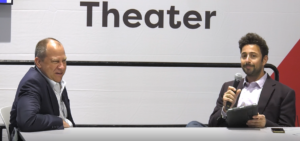Voices of Biotech
Podcast: MilliporeSigma says education vital to creating unbreakable chain for sustainability
MilliporeSigma discusses the importance of people, education, and the benefits of embracing discomfort to bolster sustainability efforts.
August 24, 2022
Sponsored by Oxford Biomedica Solutions
 Moderator: Dan Stanton, Co-founder and Editor, BioProcess Insider.
Moderator: Dan Stanton, Co-founder and Editor, BioProcess Insider.
Featuring: David Backer, Chief Commercial Officer, Oxford Biomedica.
Early in 2022, Oxford Biomedica (OXB) purchased a majority stake in Homology Medicines. The companies have taken similar journeys, the primary difference being that they have worked with lentivirus (LV) and adenoassociated virus (AAV) vectors, respectively. Both companies started as drug developers and established manufacturing capacity to support internal products. Because of program attrition, OXB began offering its capabilities as a service. OXB now owns a controlling stake in Homology, including oversight of its process development, analytical, manufacturing, and quality groups. Homology retains control over its drug development unit.
OXB’s manufacturing process is based on transient transfection in suspension cell cultures, an approach traditionally found to be too large-scale for early clinical manufacturing. But increasingly, some clients choose to begin clinical work with suspension cultures to facilitate scale-up. LV applications are broadening as the field moves beyond chimeric antigen receptor (CAR) approaches into natural killer (NK) cells. AAV remains the vector of choice for therapies targeting monogenic diseases. Backer noted that although some contract development and manufacturing organizations (CDMOs) offer 2,000-L culture capabilities, 500 L continues to be the “sweet spot” that balances process output and quality.
Despite manufacturing developments, the gene therapy industry has stagnated a bit because of sporadic investment from venture capital firms and imbalances between vector demand and supply. Amid the turmoil, OXB has benefited from close industry relationships and efforts to intensify processes. Backer observed that companies often conceive of gene therapy manufacturing as a “linear” activity. Such thinking compels them to stockpile capacity and qualified scientists. OXB has focused on optimizing its operations instead of participating in the “land grab” for capacity and staff.
Fill out the form below to view the full BPI Theater webcast.
You May Also Like